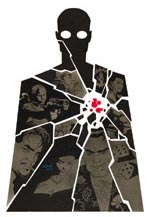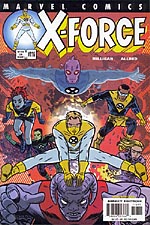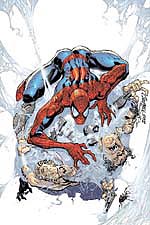>> Top Nine: Wheeler's Choice
>> Comment: 'San Diego', To The Tune Of 'Desperado'
More...

Joe Quesada and Bill Jemas have been hailed as the architects of a turnaround in sales and creativity at Marvel. But for many industry observers, the clearest sign that things were really changing - and that a 'New Marvel' was emerging - was the move to poach two of DC Vertigo's most respected editing talents, Axel Alonso and Stuart Moore.
Alonso arrived at Marvel at a time when the company was showing a new willingness to take risks and break with old conventions. Which apparently included giving stewardship of the company's biggest name character, Spider-Man, to a man whose previous projects had included PREACHER, 100 BULLETS and HELLBLAZER.
'When I was a kid I never made a distinction between Marvel and DC.' Ninth Art caught up with Alonso at the 2002 UK Comics Festival in Bristol. It was Marvel's first time at the festival, and marked one of the company's first opportunities to try out its new approach to conventions. No tables, lots of mingling.
"There was a decision made early on in the year that Marvel's money could be better spent in regards to conventions having less of a presence; pressing the flesh with the talent and meeting people," Alonso explains. "The decision was made to send more editors and more freelancers, and to go to more of them.
"Several of my freelancers who I wasn't anticipating being able to send to any conventions are going to be going, and many of the assistant editors, who, let's face it, will really be able to make their first projects based on the personal relationships they make, will also be able to attend."
Every editor has to start somewhere. Alonso says his break came about largely due to luck. "Mainly because the editor who had interviewed me at the time recognised my by-line from a piece I had written in my former life as a journalist, because I have an uncommon name. He called me in, and we basically shot the shit for forty-five minutes. I wondered, 'When is the interview going to commence?' and he said, 'Do you want the job?'
"I responded to an ad in the New York Times. My wife said, go ahead, make the call, see what DC Comics looks like. ... When I was offered the job I was kind of stunned, because I wasn't fully prepared to take it. And it really was a question of; do I want to move out of journalism and move into this field?
 So for Alonso, it was a shot in the dark - a spin of the wheel. "I don't know how people end up in comics," he claims. "Stuart Moore worked in book publishing. Bronwyn Taggart worked in radio. There's a number of people at Marvel or DC who came from outside disciplines."
So for Alonso, it was a shot in the dark - a spin of the wheel. "I don't know how people end up in comics," he claims. "Stuart Moore worked in book publishing. Bronwyn Taggart worked in radio. There's a number of people at Marvel or DC who came from outside disciplines."
(Since this interview was conducted, Taggart has been fired from Marvel and Moore has quit to pursue his writing career. Ninth Art caught up with Alonso to get his thoughts on Moore's departure. "I am, of course, very sad to see Stuart leave," he told us. "He is a very close friend, a talented editor whom I greatly admire, and, of course, my favourite Marvel staffer to taunt. That said, I think that Stuart's decision is the right one for him; he is at a stage in his career where he's ready for new challenges, and his first forays into comics writing have been encouraging, to say the least.")
How important does Alonso think it is that editors have a love of comics? "Like with any medium, there should be some passion involved in it," he claims. "I think where it comes to a fault is when passion's the only thing you've got. I love comics, and loved comics when I was a kid. I never for a moment thought I would be working in comics."
And was Li'l Alonso a DC fan or a Marvel zombie? "I never made a distinction," he replies diplomatically. "I liked the characters, and I liked artists and writers. It seems lunacy to me to decide you like one company. There's DC books I love, and there happens to be more Marvel books I like, but I work for Marvel!
"When I was a kid I remember I adored SHANG-CHI, MASTER OF KUNG FU, I adored SGT ROCK. I loved THE HULK, I loved THE UNKNOWN SOLDIER. I never was a member of any camp."
It could be considered a candid revelation, given the renewed efforts Marvel has been making to reaffirm the Marvel/DC rivalry, where readers are expected to ally themselves to either one company or the other.
'You can't be afraid to lose your job. If push comes to shove, I'll walk.' "I think that's part of the heightened sense of competition. I think there's a lot of fun to be found in competition between the companies. It's like a prizefight. You go into it, you convince people that you're the place to be, and let them decide when they read your books.
"I find it hard to believe that there are people reading a number of books in my stable that aren't reading a few Vertigo books. People who read BANNER are probably reading 100 BULLETS."
Given Vertigo's strong critical reputation, how did Alonso make the decision to move to a company whose 'House Of Ideas' label had long been considered a joke?
"It wasn't an easy one, because I was happy. I left DC on amicable terms. I was having a good time; I had a lot of latitude at Vertigo. There were a lot of books I left behind that it was not easy leaving.
"I really saw it as an opportunity I couldn't turn down. When I discovered that Joe Quesada was going to be editor-in-chief, I just really got a sense that this was going to be a ground zero revamp of the company, and that I would be kicking myself if he turned it around without me. I was very clear ... about what I wanted, creatively, when I came, and I feel like for the most part everything has been honoured. The X-FORCE revamp is a testament to the fact that they wanted me to actually use my Rolodex."
Alonso's Rolodex is probably the envy of the industry, and it seems any spin would turn up a big name creator with nothing but good things to say about the editor. So what does it take to secure that kind of respect in this industry?
"One of the most important things about being a comic book editor is that you can't be afraid to lose your job. ... If push comes to shove, I'll walk. There are lines in the sand, and I think that that's important, and I hope that a number of the creators I work with understand that I'm prepared to do that.
 "The second thing is that you know when you need to roll up your sleeves and get involved, and when you don't. There are times when you have a project that takes on a life that no one anticipated, X-FORCE being a perfect example. I've just had drinks with Peter [Milligan, X-FORCE writer] back in London - by drinks I mean many drinks - and we just shot the shit about the book and how none of us understand where it's going or how the hell we got here.
"The second thing is that you know when you need to roll up your sleeves and get involved, and when you don't. There are times when you have a project that takes on a life that no one anticipated, X-FORCE being a perfect example. I've just had drinks with Peter [Milligan, X-FORCE writer] back in London - by drinks I mean many drinks - and we just shot the shit about the book and how none of us understand where it's going or how the hell we got here.
"An editor's got to know when to step back, when to roll up their sleeves and when to cut their losses."
Which begs the question, has he had to cut his losses at all since joining Marvel?
"It's hard to say. I prefer to think I haven't. I do feel I've got a lot of work on my plate and I need to think about what work I need to move off of my plate. We're driven by a very different bottom line imperative than DC because our bottom line is just so severe. I think that it encourages a sense of pragmatism on my part, but I don't think, so far, it's forced me to compromise creatively.
"X-FORCE, that was by no means a done deal from a sales perspective. The pleasant surprise was that a book that we anticipated would be good turned into a book that actually made money. I like to remind people of that when they say, 'You wanna use who?'"
For a long time, X-FORCE was Alonso's only book at the 'X' stable - he says he's never really read the x-books - but he's recently taken charge of WOLVERINE as well. "I was given WOLVERINE with a different mandate, a mandate that I didn't have to worry about the Wolverine who interacts and is integrated into the X-Men universe. We can play him as a solo character. So I'm finding him easier to get my mind around. Up front I didn't really know Wolverine all that well. I'm learning to know him."
Wolverine's a big name, but Alonso's already handled the biggest Marvel has to offer. And as with Wolverine, when he first came to Spider-Man, he wasn't a huge fan.
"I've learned to have a deep affection for Spider-Man, but I didn't have it immediately. I read him as a kid, but he wasn't my favourite. He's since become - and I say this without any artifice - easily one of my favourite characters, because I've learned about the nooks and crannies in the character.
 "I appreciate him even more from a pop culture perspective than anything. When I've seen the way he resonates with little kids, when I've seen the way he resonates with guys I play basketball with, he's really an incredible pop culture figure in America, and I think he's a very relatable character. The fact that he wears a mask that obscures his features makes him the type of cipher that anyone of any race, creed or colour can relate to if they choose to. It's not until he strips off his mask that he's revealed as being the white guy from Queens."
"I appreciate him even more from a pop culture perspective than anything. When I've seen the way he resonates with little kids, when I've seen the way he resonates with guys I play basketball with, he's really an incredible pop culture figure in America, and I think he's a very relatable character. The fact that he wears a mask that obscures his features makes him the type of cipher that anyone of any race, creed or colour can relate to if they choose to. It's not until he strips off his mask that he's revealed as being the white guy from Queens."
Of course, the character's pop culture standing has only increased since the release of the SPIDER-MAN movie. After Marvel's failure to cash in on the success of Bryan Singer's X-MEN, the pressure was on for Alonso to drag readers in on the Spider-books. Has he been up to the task?
"Straczynski and Romita's efforts on AMAZING SPIDER-MAN have more than doubled sales - could well triple sales on the monthly title within the next few months - so their work has put me in the position where I don't need to be looking over my shoulder," says Alonso. "It is your wet dream to get those numbers in the advent of the movie. We did it before that.
"I think that the goal for me with the SPIDER-MAN spin-offs was to make sure that we weren't ignored during the movie. Entertainment Weekly just ran a half page review of THE MEGALOMANIACAL SPIDER-MAN, in which Peter Bagge retold the origin and showed different roads. It was called, 'a perfectly timed parody that showed a good corporate sense of humour'. So I think my job was done there."
'There's room for improvement everywhere. There's still books that need mending.' It can't be an easy job to do, of course, because he has to share a building with the all-singing, all-dancing Bill & Joe Show. Jemas and Quesada have become the industry's most controversial double act since Wertham and Kefauver. How on earth does he cope?
"I wear a helmet.
"I get along great with both of them. Bill has taken to harassing me so much that when he leaves I go through separation anxiety, because no one taunts me more than Bill. I've yet to hear Bill say a nice thing to me, but rumour has it he likes me.
"Joe and I get along great. He's laissez-faire to the degree that's necessary and [provides] good input to the degree that's necessary.
"I greatly admire what's been accomplished by Bill and Joe - Bill in particular - in terms of just prescribing a vision for this company and doing what was needed to get things done."
The work's not over yet, however. "I think it's very important that you continue to challenge yourself and not rest on your laurels," says Alonso. "I think that there's room for improvement everywhere within the company - any editor would argue there's still books that need mending."
It looks like Alonso's very much a Marvel man now, so how does he feel about the company he's left behind?
"I think DC can be unappreciated, sometimes, by certain people in the comics community. The importance of a line like the Vertigo imprint goes without saying. I think it's to DC's credit that they're willing to have this arm that creates inroads for the adult audience and is willing to do the sort of material that Vertigo does.
"Of course, I want to pound them into mush..."

This article is Ideological Freeware. The author grants permission for its reproduction and redistribution by private individuals on condition that the author and source of the article are clearly shown, no charge is made, and the whole article is reproduced intact, including this notice.


